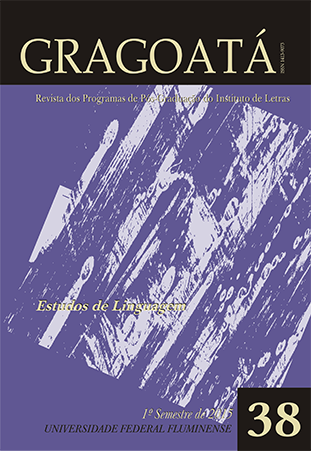ALGUMAS REFLEXÕES SOBRE A LINGUÍSTICA GERATIVA, SUA EVOLUÇÃO, SEUS AVANÇOS E MÉTODOS
DOI:
https://doi.org/10.22409/gragoata.v20i38.33303Palavras-chave:
gerativismo, minimalismo, avaliação crítica, epistemologiaResumo
Este artigo apresenta uma discussão sobre a teoria linguística gerativa no que se refere a aspectos de sua evolução histórica, de seus avanços obtidos e de suas opções metodológicas. Em especial, busca-se uma forma de se mensurar os incrementos alcançados pelo gerativismo desde as suas proposições iniciais (cf. CHOMSKY, 1957) até os dias atuais (cf. CHOMSKY, 2013), valendo-se, para essa tarefa, do referencial teórico proposto pela Filosofia da Ciência de Lakatos (1978). A ideia básica a ser discutida é a criação de critérios pelos quais se permita saber o quanto o gerativismo tem de fato progredido enquanto teoria, fazendo avançar o conhecimento sobre a linguagem humana e revelando caminhos realmente promissores para o futuro da pesquisa em Linguística. As conclusões caminham na direção de que, a despeito das inegáveis conquistas que a teoria gerativa obteve a respeito do nosso entendimento da linguagem humana, questões epistemológicas e metodológicas ainda requerem uma discussão mais aprofundada, visando à consolidação das descobertas e propostas gerativistas como conhecimento científico confiável.
Downloads
Downloads
Publicado
Edição
Seção
Licença
AUTORIZAÇÃO
Autores que publicam em Gragoatá concordam com os seguintes termos:
Os autores mantêm os direitos e cedem à revista o direito à primeira publicação, simultaneamente submetido a uma licença Creative Commons Atribuição 4.0 Internacional (CC BY 4.0), que permite o compartilhamento por terceiros com a devida menção ao autor e à primeira publicação pela Gragoatá.
Os autores podem entrar em acordos contratuais adicionais e separados para a distribuição não exclusiva da versão publicada da obra (por exemplo, postá-la em um repositório institucional ou publicá-la em um livro), com o reconhecimento de sua publicação inicial na Gragoatá.
A Gragoatá utiliza uma Licença Creative Commons - Atribuição CC BY 4.0 Internacional.











